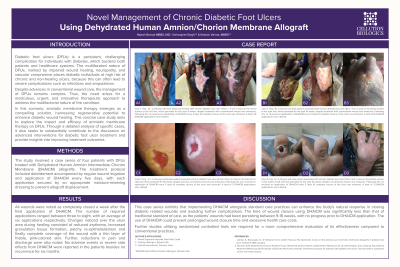Case Series/Study
(CS-015) Novel Management of Chronic Diabetic foot Ulcers using Dehydrated Human Amnion/Chorion Membrane Allograft

Methods:
The study involved a case series of four patients with DFUs treated with Dehydrated Human Amnion Chorion Membrane (DHACM) allografts. The treatment protocol included debridement accompanied by regular wound irrigation and application of DHACM every five days, with each application secured by an appropriate moisture-retaining dressing to prevent allograft displacement.
Results: All wounds were noted as completely closed, a week after the final application of DHACM. The number of needed applications ranged between three to eight applications, with an average of six applications respectively. Changes noticed over the ulcer area during healing consisted of reduction in erythema, increased granulation tissue formation, patchy re-epithelialization and finally complete coverage of the wound with a thin layer of friable, pink colored skin. Further, reductions in pain and discharge were also noted. No adverse events or severe adverse effects from DHACM were reported in any patients, and there has been no recurrence for six months.
Discussion: This case series exhibits that implementing DHACM alongside standard of care practices can enhance the body's natural response in closing diabetic related wounds and avoiding further complications. The time to wound closure using DHACM was significantly less than the time that was executed on traditional standard of care, as the patient's wounds had been persisting between 9-16 weeks, with no progress prior to DHACM application. The use of DHACM could prevent excessive wound closure time and health care costs.

.jpeg)